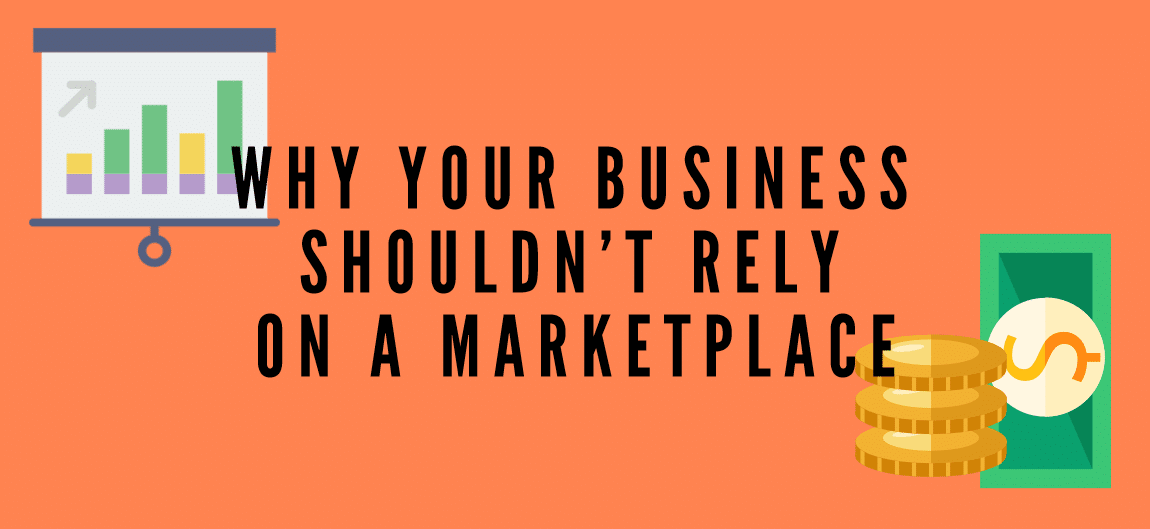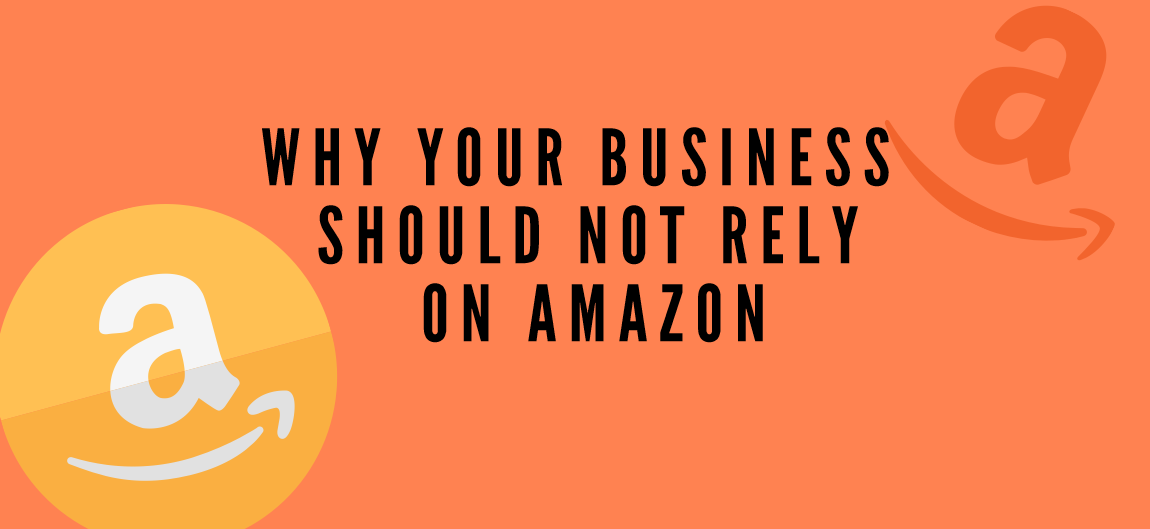Many of our customers use import goods to sell on marketplaces like Amazon as their main income stream. We understand why; it’s simple, you don’t need to worry about marketing and you have instant access to the marketplace’s massive consumer base.
However, in the long term, is this smart? Is selling goods through a single marketplace (such as Etsy, eBay, Amazon, etc) a viable business option? Is it maintainable?
The answer, to be blunt, is probably not.
When you rely on a platform, that platform owns you and your business. It owns your success. If Amazon decides to change one of its policies, or a customer wrongfully files a case against you and your business is restricted or cut off…that’s your business struck out if you don’t have a backup plan.
Some of the best advice you can use when selling online is to diversify your income streams and don’t depend on one marketplace. With multiple income streams, if the worst happens and one marketplace becomes unusable, you aren’t left stranded.
-
Why relying on any one marketplace is a bad idea for your business
It’s important to note: we aren’t saying don’t use marketplaces. Marketplaces are great – they’re a brilliant way to gain business and kick off the ground without needing to take too much time to set up. What we are saying is that solely depending on a marketplace is not a good idea.
Let’s look at some of the reasons that solely relying on a marketplace is not a good idea.
- Stunts your growthWhen you’re reliant on a marketplace platform, you don’t need to put in all that hard work to grow and maintain a separate website – so most people won’t. However, all this means is that you:A. Don’t develop a brand. This is bad for multiple reasons; the main one being that without a brand . . . to your customers, at least, you don’t have a business. In their mind, they didn’t buy that really cool USB stick from Calvin’sComicCreations – they bought it off Ebay. So, while you do make a sale, you often lose the chance to gain a loyal customer.
B. Have nothing to fall back on. In a way, this leads on from the previous point. Once you’ve left a marketplace . . . there’s nothing left. After your years of hard work, your brand name will in all likelihood still be unknown; you won’t have a loyal herd of customers and fans; if you want to continue in the e-commerce business, in all likelihood you’ll need to start from the bottom again.
Neither of these are good options.
- Algorithm changes and updatesMarketplaces belong to someone else. They are businesses – and businesses (well, the good ones, at least) are constantly changing. These changes can be incremental to the marketplace, but absolutely devastating to your business.
- The devil owns your soulWell, not literally – but you have to play by someone else’s rules and if you leave them . . . well, where will you be then?
- Profit margins aren’t as highThis is a situation that you’d have to work out for yourself, but are the benefits of the marketplace you’re on outweighing the fees you’re paying to be on there? Often, the profit margin increases substantially if you remove the marketplace fees.
- Your entire business is dependent on someone elseWhen you say it like that, it sounds unreliable – your entire business is dependent on a third party who has no reason to care about it. A third party who, to be honest, is going to want to earn more money for themselves and further grow their business.
Each marketplace is different, however. We’re going to look at a few different marketplaces and identify their risks.
- Stunts your growthWhen you’re reliant on a marketplace platform, you don’t need to put in all that hard work to grow and maintain a separate website – so most people won’t. However, all this means is that you:A. Don’t develop a brand. This is bad for multiple reasons; the main one being that without a brand . . . to your customers, at least, you don’t have a business. In their mind, they didn’t buy that really cool USB stick from Calvin’sComicCreations – they bought it off Ebay. So, while you do make a sale, you often lose the chance to gain a loyal customer.
-
Why Amazon shouldn't be your only income channel
- They turn your customers into their customersAny marketer ever will scream the importance of email marketing to anyone who will listen.You’ll be hurrying past, trying to mind your own business, when they appear.
At first glance, they look smart and polished. But as they get closer, you realise their suits are worn and dirty; their hair is ravaged and wild from where they’ve grabbed fistfuls of it in agitation…
Rabid eyes settle on you. The much-feared marketers start to hobble in your direction, getting closer, desperation in their frantic movements. Suddenly, their fevered excitement reaches a peak and, just as you prepare to run, they start barking email marketing facts:
“Email is 40 times more effective at acquiring new customers than Facebook or Twitter!”
E-mail marketing is the secret weapon for customer retention – and an essential part of driving sales for your business forward. If you asked pretty much any marketer to choose between e-mail marketing and their thumb…well, thumb-wars would be a thing of the past.
But guess what you don’t have access to when selling via Amazon?
Your customer’s emails. Amazon has access to them; Amazon sends targeted e-mail marketing campaigns and earns using them. Because, when you sell on Amazon, your customers aren’t your customers. They’re Amazon’s – and, although this is merely one example of how, there is a big difference.
- Policy changesThis has actually happened many times.At any time, Amazon can decide to implement a new policy that cuts your business off at the knees. Not too long ago, sellers could give customers incentives for reviews – discounts and free items in exchange for a review on Amazon – which a lot of businesses used to promote their products and kick off an effective launch.
However, this approach no longer works. Why?
Amazon doesn’t allow it any more.
Many businesses were hit hard; for some, incentivised reviews were their main marketing effort. Policy changes like this can come into effect whenever Amazon decide to implement them and sweep the rug out from underneath your business’s feet.
- Your business is subject to their whims; they can close you down whenever they feel like itExpanding on our previous point, Amazon has complete control over your business – and, if they choose to close it down, you have to take it.There are horror stories where businesses receive unfair feedback from a customer, yet still get closed down.
- You have much less control over your businessAt the end of the day, your business is yours. You want control and you want freedom. You want to be able to implement your ideas – and you can. Just not while your main source of income is through the Amazon marketplace.
- Eats into your profitSelling on Amazon comes with a bucket-load of fees.In many ways, these fees are understandable – essentially Amazon is your marketing and, with such a massive built-in customer base, it’s incredibly effective. However, these fees bite into your profit massively. Your profit margin once you sell on other platforms is much higher – so, once you get going, you have the potential to earn a lot more.
- They turn your customers into their customersAny marketer ever will scream the importance of email marketing to anyone who will listen.You’ll be hurrying past, trying to mind your own business, when they appear.
-
Why Ebay shouldn't be your sole income
- Ebay favours customers in disputesThis doesn’t necessarily sound like a bad thing – you aren’t planning to screw over your customers, so what’s the issue? Well, just because you aren’t out to get your customers doesn’t mean that they aren’t out to get you. There have been many cases of ridiculous situations in which a customer can simply say “I didn’t receive my package” and get a full refund.In fact, one of our customers used to host a majority of his business on Ebay and got burned.
“I had a huge setback with eBay. Which was 90% of my sales. As a result, the business lost about £20k of sales and a profit hit of multiple thousands!” – Panda eBikes
- Ebay charges selling fees!
Enough said!
- Ebay favours customers in disputesThis doesn’t necessarily sound like a bad thing – you aren’t planning to screw over your customers, so what’s the issue? Well, just because you aren’t out to get your customers doesn’t mean that they aren’t out to get you. There have been many cases of ridiculous situations in which a customer can simply say “I didn’t receive my package” and get a full refund.In fact, one of our customers used to host a majority of his business on Ebay and got burned.
-
How can you diversify your income streams?
- Invest in your own e-commerce siteIf you invest in your own e-commerce site, then it’s yours. It belongs to your business, you control it and you can implement any changes or ideas that you’d like.
- Utilise various marketplacesYou don’t have to stick to one marketplace! Selling across multiple platforms not only means you have multiple sources of income; it means that you’re reaching an even bigger audience.
Although selling on marketplaces like Amazon or eBay comes with a legion of advantages and provides many benefits to your business, it’s worth diversifying your business’s methods just to ensure that your income remains reliable and secure. In the worst-case scenario that something does happen to make the platform less suited to your business, having backup plans in place will be a literal life-saver.
-
Sea Freight From Shippo
We hope you found this post helpful. If you have your eggs spread across a few baskets and want to import more products to sell on various marketplaces, keep us in mind! You can contact us for more advice on importing or grab a quote if you’re ready to get going.
Great service, great people. A really great freight forwarder. Don’t look anywhere else. After having some bad experiences with other forwarders in the UK, we’re so happy we’ve found a long term partner in Shippo. They go above and beyond when required.Lynette HoltonMore posts
Protect Yourself From Hidden Fees When Importing From China
0 commentsWe all want an all-inclusive quote when we’re offered a price right…? When it comes to importing this isn’t always the case. Shippo can make
LCL – How Will My Goods Be Delivered
0 commentsThe standard delivery offered when importing goods to the UK is kerbside. This means that the driver will park up outside your premises and it’s
FCL – How Will My Goods Be Delivered?
0 commentsAs with the standard deliveries, full container load deliveries are “kerbside” This means the container will arrive on the back of the truck and you’ll




